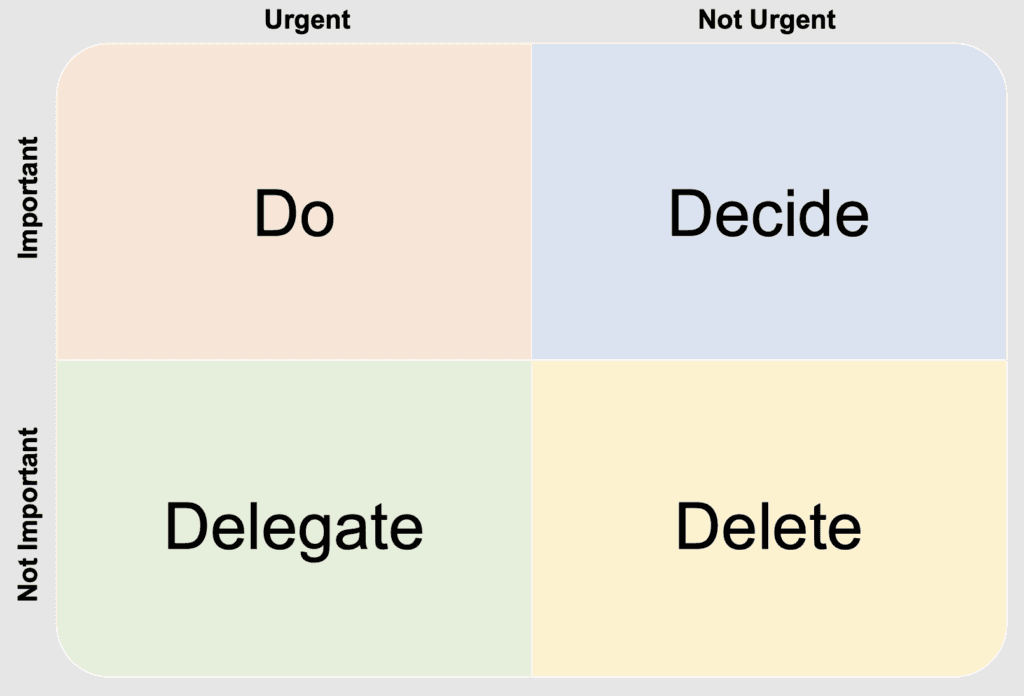How to guard against overwork with 4 effective rules to reduce effort, eliminate stress and achieve your goals in only one-fifth of the time.
“Working hard for something we don’t care about is called stress. Working hard for something we love is called passion,” said Simon Sinek. We have become accustomed to believing that more effort means more success. But what if I told you that the secret to achieving your goals is not to work harder, but to eliminate all effort?
In this article, you will discover the four essential rules for managing overwork while reducing stress. You’ll find that letting go of the effort will eliminate stress and, surprisingly, you’ll achieve your goals more effectively. Ready? Let’s get started!

Too much stress at work
Stress at work is not always bad. If understood as the tension that drives us forward, stress can be a motivator. Think of the athlete’s tension before competition, the one that pushes him to give his all and push his limits. This kind of positive stress, more correctly called eustress, is a fuel that keeps us moving purposefully toward our goals.
Unfortunately, stress more often has another face. Stress is also what makes us feel crushed, overwhelmed, lacking control. It is that tension that, if excessive, can turn into burnout, the critical threshold beyond which we feel burdened and frustrated by work.
According to a Deloitte survey, 77 percent of professionals surveyed have suffered from burnout at least once in their current job. These figures are alarming considering the consequences of burnout on our physical and mental health: difficulty concentrating, sleep problems, fatigue, changes in nutrition, emotional swings.
It then becomes essential to distinguish between the two concepts: motivational tension of eustress (positive) on the one hand and stress (negative) on the other. And when it comes to too much negative stress at work, as explained in our article on Blue Monday, you need to change your perspective: stress should not only be managed, but eliminated at its root. Let’s see now in detail how you can accomplish this.
How to guard against overwork
To guard against excessive workload, it no doubt helps to establish clear boundaries between work and leisure. To do this, you can take specific precautions. For example, actively plan your free time to intentionally devote to recreational activities and your personal goals. You can start your days off on the right foot with a morning ritual. Also, strictly respect your break times. Resist the temptation to constantly check emails outside of work hours.
However, in addition to organizing free time, there is another crucial aspect: time management during working hours. Effectively organizing activities and prioritizing tasks according to their importance can make the difference between a productive day and a stressful one. When you focus your energy on the activities with the greatest impact, you not only reduce stress, you get more done with less effort.
But how can you actually do this? How can you take charge of your work to transform your days from stressful to productive? In this article you will discover precise techniques for doing so. For example, applying the Pareto principle will save you 80% of your time. Or again: working in flow, that is, in the state of maximum concentration, will be easier when you apply Eisenhower’s matrix to distinguish between what is urgent and important and what is not.
Pareto principle? Eisenhower matrix? If these terminologies are new to you, you will find our article particularly helpful. So let’s explore together these 4 golden rules for working more effectively, calmly and consciously, facing overwork with less stress.
4 rules for managing overwork
1. 80/20 principle: minimum effort, maximum yield
“I’m too much of a perfectionist.” Who hasn’t heard this used at least once as a fake flaw in a job interview? It is actually a real flaw: perfectionism is a blight on productivity, as pointed out by the 80/20 principle.
Also known as the Pareto principle, this is an economic theory devised by Italian economist Vilfredo Pareto. According to this theory, 80% of effects come from 20% of causes. For example, at work 80% of results come from 20% of efforts.
Think of it as picking fruit from the tree. You start by picking the lowest fruit. Effortlessly. But then you get to the top of the tree: suddenly, you find yourself climbing through the branches and tackling the thickest branches to be able to pick the last fruits.

Our productivity works the same way. For example, when you write the draft of a work email, the ideas flow easily. But once you focus on the details, checking two or three times, agonizing over word choice or trying to turn something good into something perfect, you get stuck.
How to apply this rule in your work? When you start working each morning, realize that you are spending 80 percent of your time on tasks that do not contribute much to your bottom line. So actively reflect on the activities that absorb your time and compare your effort with the possible gain. To do this, productivity specialist Scott H. Young recommends this practical method:
- Write down all the steps required for a certain task at work and the time you spend on each one (one hour for researching new clients, one hour for emails, two hours for meetings, and so on).
- Estimate with a percentage how much you think each activity contributes to your results.
- It eliminates high-effort, low-yield tasks, such as an unnecessary step in an approval process or the third round of document review.
This analysis helps you in strategic planning. Look for opportunities to reduce efforts that do not lead to great results. For projects you cannot eliminate, this exercise will encourage you not to get lost in the details.
2. Eisenhower matrix: the art of distinguishing the important from the urgent
The Eisenhower Matrix, first introduced by Stephen Covey in his book “Seven Habits of Highly Effective People,” is a model that helps us distinguish between urgent activities, important activities, and activities that are neither urgent nor important.
“Urgent,” “important?” But aren’t they synonyms? Not at all. According to the Eisenhower principle, there is a fundamental distinction between the two. Let’s see why.

Urgent activities require your immediate attention. When something is urgent, it must be done immediately. For example, there are clear consequences if you do not complete the task within a certain period of time. These are activities you cannot avoid, and the longer you postpone them, the more stress you will experience.
Here are some examples of urgent activities:
- Delivering a project with an impending due date
- Addressing a cybersecurity issue
- Handling an urgent customer request
On the other hand, important activities may not require immediate attention, but they are essential to achieving your long-term goals. The fact that these activities are less urgent does not mean that they are not important. On the contrary: they are crucial activities that require careful planning. Here are some examples of important activities:
- Plan a long-term project
- Conduct a market assessment to identify opportunities for growth
- Promote personal and professional growth through readings and trainings
This distinction is like a compass. To use it in your work, the next time you tackle a new task, start with this question: is it important or urgent? First, if the task is neither urgent nor important, the solution is clear: eliminate. Often it is a distraction, whether you are immediately aware of it or not.
But there is more: you will be surprised how most of your time at work is consumed by urgent but unimportant tasks. To handle these emergencies, do what is not only urgent but also important and delegate to others what is not functional to your goals. Also, decide exactly when you will do your important activities each day. You can do this by putting a reminder in your calendar (for example, block off your calendar from 9 to 11 every morning to work on your long-term project).
In short, eliminate what you can, delegate the rest, and regain your time to focus on what really matters. If you are interested in this topic, find out more in our article on the 3 most frequently asked questions for career success.
3. Satisfaction: throw work-life balance out the window
The idea of work-life balance, known as work-life balance, has deep roots in the way we perceive well-being. According to this idea, you cannot live a healthy life unless you separate work from the rest of your personal life and seek a balance between work demands and the other elements of your life. But let’s stop and think for a moment: is the solution really finding this balance?
The truth is that the very idea of work-life balance can be harmful and limiting. This notion invokes a constant struggle between work and life, a zero-sum game where devoting more to work means sacrificing your life. In short, the idea that you would only really live when you are not working.

Originally, work-life balance began as a key principle of well-being. There are at least two reasons for this. First, it is clear that if you focus all your time and energy on a job you do not enjoy, your physical and mental health will suffer. Second, if you invest all your time, resources and energy in your career, you will probably then lack resources for other things, such as family and hobbies. However, instead of solving the root of the problem, the myopic idea of work-life balance puts a Band-Aid on the wound, without solving the problem upstream.
Throw the concept of work-life balance out the window. This approach only attempts to treat the symptom, not the disease. More importantly, it fuels a toxic relationship with work, making you believe that work is something separate from life.
Overcoming this idea does not mean sacrificing family, leisure time and passions for work. On the contrary, it means focusing on integrating what we are passionate about and fulfilled in all areas of our lives. It means directing one’s time, resources and energies holistically toward activities that contribute to one’s well-being and personal growth, whether in work or leisure.
Look beyond the idea of work as an adversary to life. Rather, see work as an opportunity to grow, connect with others and expand your potential. Even if, as is often the case, your current job is not aligned with your true passions, you can still use it as a platform for personal expression. Look for opportunities that reflect your interests, openly communicate your preferences with your manager, take advantage of available internal resources. Most importantly, approach work challenges with a growth mindset, turning them into opportunities for self-improvement. Read our article on Blue Monday to break out of passivity and take control of your life.
4. Flow: the magical place where things happen effortlessly
The concept of flow coined by psychologist Mihaly Csikszentmihalyi, is a mental state of deep immersion in an activity. In the flow state, one feels completely engaged and focused. Time seems to flow quickly and actions are performed with a surprising, almost effortless naturalness.
Positive psychology confirms the benefits of flow. During flow, one is in a state of maximum mental and emotional efficiency, faces challenges with clarity and determination, and produces better results.
Not only that, flow acts as a shield against stress. When you are immersed in an activity that you are passionate about, worries and stress tend to dissolve.

But how to achieve the flow state? The book “Flow: Psychology of Optimal Experience” by Mihaly Csikszentmihalyi provides valuable guidance. Even when you don’t have control over most work activities, you can still try to create conditions conducive to the flow experience. Here’s how to do it in 3 moves:
- Find a balance between your skills and the challenges: Try to balance the difficulty of the tasks with your skill level. If the challenges are too large relative to your current skill or experience level, you may feel overwhelmed; if they are too small, you may get bored. The goal is to find an optimal balance that keeps you engaged and focused.
- Immerse yourself completely in the present activity: Eliminate distractions and focus your attention completely on the activity you are doing. Practice these 10 mindfulness exercises to return to the present moment and block out any thoughts that might distract you from the activity. You can also use meditation apps or take a mindful pause before diving into the activity.
- Find meaning in the activity: Choose activities that have personal meaning for you and bring you closer to your goals. Feeling connected and emotionally involved in the activity will help you enter the flow state more easily.
Of course, there are work situations that do not allow this. In these cases, it is important to ask ourselves whether we are doing what we really want to do and what is preventing us from changing. Authentic and honest reflection on our work and the beliefs that prevent us from improving our conditions is the basis of everything.
Letting go of effort: a new perspective on managing overwork
You have to work hard, it takes sacrifice, there is no gain without effort…. In a world that values effort as synonymous with success, it is easy to fall into the trap of stress. However, if you want to manage overwork and reduce stress, you need to change your mindset: abandon the idea that incessant effort is the key to success.
If you have read this far, you now know four effective rules that will guide you along this path. Letting go of effort and applying these techniques will allow you not only to manage your work more calmly, but also to achieve your goals with greater clarity and effectiveness. Embrace this new perspective and let it guide you to extraordinary results more lightly.
Find us on social media
